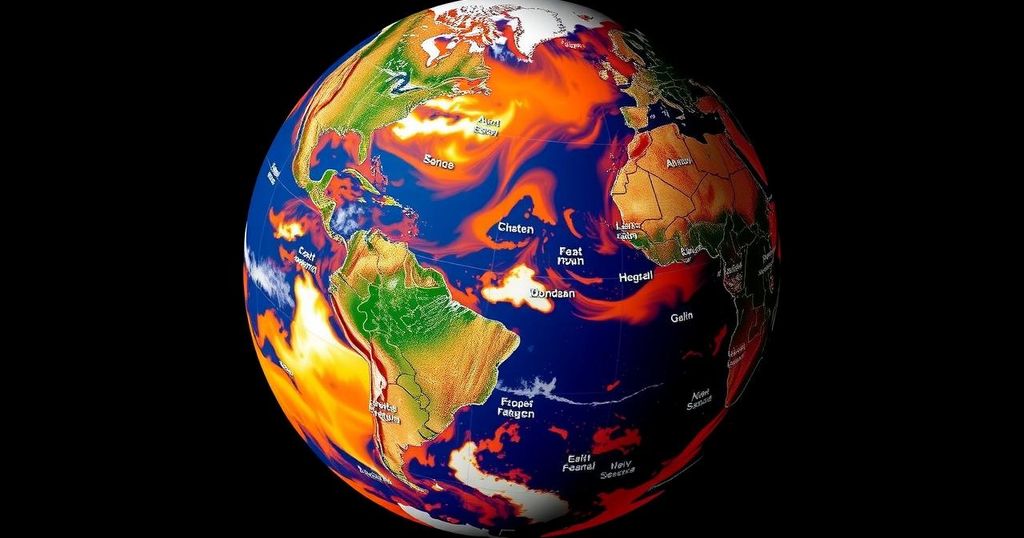Climate change
ACTION, ASIA, AZERBAIJAN, BAKU, BILL HARE, CHINA, CLIMATE, CLIMATE ANALYTICS, CLIMATE CHANGE, COP, ENVIRONMENTAL POLICY, EUROPE, FRANCE, GLOBAL WARMING, GONZALES - ZUNIGA, GREENHOUSE GAS EMISSIONS, HARE, MEXICO, NORTH AMERICA, PARIS, PARIS AGREEMENT, TRUMP, U. S, UNITED NATIONS, UNITED STATES
Leila Ramsay
0 Comments
Global Warming Projections Remain Unchanged Amid Climate Talks
For the third consecutive year, efforts to curb climate change have not reduced global warming projections, with recent developments in China and the U.S. likely to increase temperature forecasts. Currently, Earth is expected to warm by 2.7 degrees Celsius compared to pre-industrial levels, heightening concerns about the effectiveness of international climate negotiations amid calls for increased financial assistance for developing nations to combat climate change.
For the third consecutive year, global warming projections have remained unchanged despite ongoing climate change mitigation efforts. An analysis released recently indicates that developments in significant countries such as China and the United States may slightly exacerbate future warming trends. This analysis is particularly timely as nations convene for the 29th session of the United Nations climate talks in Baku, Azerbaijan, where discussions are centered on emission reduction targets and financial commitments from affluent nations to assist others in combating climate change. According to the Climate Action Tracker, the Earth is currently on course to experience a temperature increase of 2.7 degrees Celsius compared to pre-industrial levels. This ongoing warming trend raises doubts regarding the effectiveness of the United Nations climate negotiations, known as Conference of the Parties (COP). Bill Hare, CEO of Climate Analytics, expressed concerns, stating, “There’s an awful lot going on that’s positive here, but on the big picture of actually getting stuff done to reduce emissions … to me it feels broken.” Although the global temperature has already risen by 1.3 degrees Celsius, nearing the critical 1.5-degree limit set during the Paris Agreement in 2015, climate science indicates that combustion of fossil fuels is intensifying weather extremes, such as droughts and floods. The Climate Action Tracker includes various projections, with some indicators showing increased warming. Notably, China’s emissions have peaked higher than anticipated, further complicating the climate outlook. Looking ahead, potential changes in U.S. climate policy, especially if reversible actions occur under a new administration, could add approximately 0.04 degrees Celsius to warming projections. While this increase might seem marginal, it could have broader implications if other nations perceive it as a justification for inaction. Bill Hare emphasized that the opportunity to witness a decrease in global emissions should already be occurring but is not; this lack of progress is alarming given the severe climate disasters observed worldwide. At the climate talks in Baku, there is a pressing debate regarding financial assistance from wealthy nations to developing countries as they strive to decarbonize and endure the adverse effects of climate change. Previous commitments of $100 billion per year are set to expire, and discussions aim to establish a more substantial financial figure. An independent group of experts underscored the urgent need for a tripling of climate financial support. A coalition of developing nations is advocating for $1.3 trillion in annual funding, while overall global climate adaptation expenditures may require up to $2.4 trillion annually. The necessity for increased investments across all nations is paramount for transitioning to sustainable energy sources and addressing climate impacts. A comprehensive commitment from advanced economies will be essential to aid developing nations in mitigating the challenges posed by climate change, emphasizing the urgency for collaborative efforts in climate finance and action.
The ongoing failure to improve projections for global warming highlights significant deficiencies in current climate action strategies. Despite international cooperation during climate negotiations, the persistent rise in emissions, particularly from major emitters such as the United States and China, threatens to jeopardize the world’s efforts to cap temperature increases. The Baku climate talks serve as a crucial platform for nations to negotiate future goals and funding strategies to combat climate change effectively. Climate projections remain critical indicators of the effectiveness of international policies and actions aimed at reducing greenhouse gas emissions. The insistent rise in temperatures and the increasing frequency of climate-related disasters underscore the urgent need for robust and accountable climate action on a global scale. The financial commitments required to assist developing nations reflect the growing realization that climate change adaptation and mitigation efforts are not solely the responsibility of less affluent countries. As climate impacts intensify, the need for global solidarity in addressing both the causes and consequences of climate change is more critical than ever.
In conclusion, the stagnation in global warming projections amidst ongoing international climate negotiations illustrates a significant challenge in effectively combating climate change. With current models indicating a potential rise of 2.7 degrees Celsius, it is vital that nations prioritize meaningful commitments and collaborations to alter this trajectory. The pressing need for substantial financial support for developing nations further emphasizes the global responsibility to address the climate crisis. Without concerted action and a willingness to hold major emitters accountable, the possibility of achieving meaningful progress in climate goals remains bleak.
Original Source: www.voanews.com




Post Comment